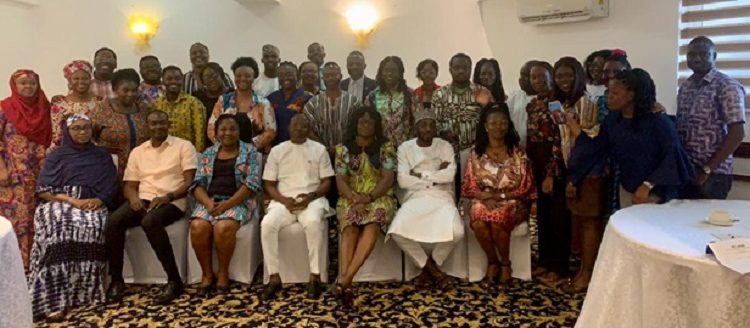A group photo of participants at the meeting
The Ghana Health Service (GHS) has outlined five key areas it would be focusing on as it works towards advancing Family Planning (FP) Services in the country.
According to the GHS, the full participation of the roll-out plan of FP under the National Health Insurance Benefits by 2030 is a priority.
Also, it indicated that it would work towards an increase in the government’s financial commitment towards the procurement of FP commodities.
The GHS said it would also focus on increasing Modern Contraceptive Prevalence Rate (mCPR) among married women or women in union, and ensure a reduction in unmet need for contraception among sexually active adolescents from 57 percent to 30 percent by 2030.
Lastly, the health authority will work towards the effective implementation of family planning behaviour change promotion through correct, consistent, and targeted social and behaviour change communications that focuses on rights-based family planning.
Director, Family Health Division, GHS, Dr. Kofi Issah, who announced this at a meeting in Accra, said the list constitutes the country’s FP 2030 commitments.
He said building on the successes of FP 2020, the country recommitted to a new partnership known as the PF 2030 with the vision that, “By the end of 2030, all persons of reproductive age in Ghana have equitable and timely access to quality family planning information, commodities, and services by 2030.”
He said the announcement was preceded by board consultations from youth across the country, development partners, CSOs and critical considerations to align with the country’s medium and long term development plan.
He explained that FP was not only about reducing the number of children one can have but also ensuring equitable and manageable family size as well as help couples and individuals to conceive.
Dr. Issah said FP was also central to achieving the Sustainable Development Goals (SDGs) 2030, adding that all facilities under the NHIS were expected to provide free family planning services to the public.
UNFPA representative Dr. Wilfred Ochan in a speech read on his behalf recounted the support the organisation and other development partners have demonstrated in ensuring access to family planning services over the years.
He said beyond supporting the government to procure high quality contraceptives to meet the public sector and social marketing requirements, they have supported supply chain interventions including the provision of technical and financial support for national quantification exercise, warehousing, storage and last mile distribution.
“With the evolvement of FP2020 global movement into FP2030 to align with SDGs 2023 timeline, it is gratifying to note that the government led development of Ghana’s commitments, this time around, with a broad based, wide range of stakeholders including intentionally and active engagement of young people across the country,” he noted.
He further pledged his organisation’s continuous support to the government’s efforts in achieving the commitments.
Family planning refers to the use of modern contraceptives or natural techniques to limit or space pregnancies.
According to the MIS 2019, the total fertility rate is 3.8 with 26.7 percent of married women using any method of family planning and 29.9 percent having unmet need for FP.
Modern methods of family planning include the pill, female and male sterilisation, IUD, injectables, implants, male and female condoms, diaphragm, and emergency contraception.
Traditional methods of FP include periodic abstinence, withdrawal, and folk methods.
According to the GHS Reproductive Health Policy, FP includes information, education, birth spacing, and childbearing.
By Jamila Akweley Okertchiri

